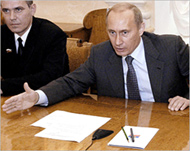Russian lawmakers ratify Kyoto treaty
Russia’s lower house of parliament has ratified the Kyoto Protocol on combating global warming.

The ratification of the environmental pact puts it one step closer to realisation and also gives Russia a boost toward joining the World Trade Organisation (WTO).
Russia’s ratification is necessary to put the pact into effect, because the United States has declined to ratify the treaty. The pact must be ratified by 55 countries that accounted for at least 55% of global emissions in 1990.
The US alone accounted for 36% of carbon dioxide emissions in 1990.
The State Duma voted 334-73 to approve the treaty which gives industrialised nations eight years to cut their collective emissions of six key greenhouse gases to 5.2% below 1990 levels.
Putin to sign
Russia’s upper house is to vote on the protocol on Wednesday and is likely to approve it, sending it to President Vladimir Putin who is expected to sign.
 |
|
Russia hopes ratifying Kyoto |
Although presidential economic adviser Andrei Illarionov has fiercely opposed ratifying the pact, Putin vowed to speed up the ratification process in May in return for the European Union’s support of Russia’s bid to join the WTO.
“By ratifying the Kyoto Protocol, Russia in fact is strengthening its international authority and becoming an ecological leader,” Vladimir Grachev, chairman of the Duma’s ecology committee, told the chamber before the vote.
First Deputy Prime Minister Alexander Zhukov has said restrictions of greenhouse gas emissions imposed by the pact would not affect Russia’s economic growth in the near future.
Even after a five-year economic recovery, the collapse of Soviet-era industry in the 1990s has left emissions some 30% below the baseline.
New terms in 2012
Zhukov has said Russia would try to negotiate terms for its participation in cutting emissions after 2012.
In an interview last week with a German newspaper, Russia’s minister for economic development and trade, German Gref, said the Kyoto Protocol should provide the means to reduce wasteful energy consumption by increasing investment in Russian industry.
He indicated that he also wants to use the pact to help modernise Russian industry. The mechanism offers the opportunity to any developed country to achieve part of its Kyoto commitment by investing in emissions reduction projects in other developed countries to get carbon credits.
A top candidate for such help would be Russia’s electricity monopoly, Unified Energy System, which produces nearly 30% of total Russian emissions.
Grachev said Kyoto would “open up the possibility of significantly solving [Russia’s] problems of energy efficiency, energy supply and adaptation to climatic changes by receiving in fact free international resources.”